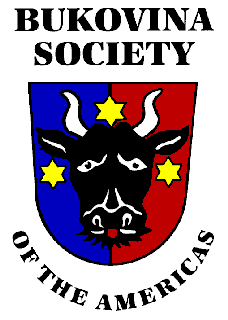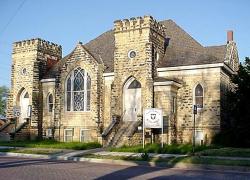 |
The Bukovina
Society of the Americas P.O. Box 81, Ellis, KS 67637, USA Martha McClelland , President info@bukovinasociety.org |
 |
|
|
||
| ||||||
BUKOVINAFEST 1996The past several issues of the newsletter have provided the list of outstanding speakers, programs, and events, so mark the dates of July 18th-21st. The spring newsletter mail out will also contain the program guide and registration form. Please let us know if anyone wishes to be on the mailing list.MEMBERSHIPSWe appreciate the prompt response from those who sent in the 1996 annual dues. Adding to our lifetime membership club since the last newsletter was:
[Image unavailable] BUKOVINA BRIEFSDo you have German documents or letters that are not only written in the Gothic script, but also horrible penmanship? Contact Edward R. Brandt for maximum chances of deciphering at minimum cost, enclosing a SASE. 13-27th Ave. S.E., Minneapolis, MN 55414-3101.The society received a Christmas greeting from the Landsmannschaft der Buchenlanddeutschen in Augsburg from Ewald Zachmann, Alice Witulski and Erwin Misakewicz. It was adorned with an ink sketch titled, Landschaft zwischen Jakobeni und Dorna-Vatra in den Karpaten. Two organizations in Germany sent us announcements of seminars. We appreciate the kind efforts to keep us informed by the Gustav Stresemann Institut and the Landsmannschaft der Buchenlanddeutschen. EXCURSION IN THE BUKOWINASome 60 people who sent in their interest in the tour will receive the brochure which describes the opportunity of a lifetime to see our ancestral land. Set for September 16th through October 1st, members of the society from Canada to Texas and California to New York will be led by an expert guide beginning in Augsburg. After a tour of the city and a visit to the Bukowina-Institut they will arrive the following day in Vienna, Austria for a visit. Then on to Budapest with first destination in Bukovina of Czernowitz, the former capital. From there the first opportunity is scheduled for participants to visit individual home villages. On to Suczawa, near the famed painted monasteries, which also afford people to see home villages in that area. The return trip to Germany will be through Hungary with lunch at Dracula's castle and other stops of interest. The tour will end with a visit to Munich's famed Oktoberfest. Hotel accommodations and all meals are planned in advance which also includes evenings at theater, cultural events and local folk group performances. In addition to a comprehensive tour of Bukovina many tourist stops along the route are planned. Anyone wishing to be placed on the list with an interest in the tour can write to Box 1083, Hays, Ks 67601-1083.BUKOVINA TODAY, FROM STEVE PARKEAdrian Dasealu reports that Romania has come from having to import wheat as a result of years of communist domination to today re-emerging as an exporter due to the 1995 bumper crop. Romania was once a breadbasket for Europe and a revival of private land ownership has led to surpluses in farm products.Karin Popescu reports that the chairman of the German Democratic Forum representing Romania's ethnic Germans attacked a new education law which he said would ignore the role of the centuries-old community from history books. Paul Philippi criticized the law for not reflecting the contributions of minorities in Romanian history. Romania's Germans have an 800-year history in Transylvania and the southwest Banat region. One of the ethnic minorities of the Bukovina (Romania) heritage were the Gypsy people who conducted a four day festival in Budapest according to Blaise Szolgyemy. The festival entitled "Rom Som" (I am Gypsy), showcased their music, theater and literature. Traditionally nomads, the immigrants from northern India arrived in East Europe beginning in the 13th century. Most have given up their famous covered wagon caravans for permanent housing and continue to preserve the wealth of their culture. BOOKSMrs. Elanora Dempster and Jack L. Vollhoffer from Canada have donated a copy of the Vollhoffer Family Tree to the society. A quick reading turned up a connection in the headquarters town of Ellis through the Huber surname. Thanks to you. Jack is also interested in receiving word from anyone who knows of the family Vollhoffer at 49 Green Lane, Apt. 411, Thornhill, Ont. Canada L3T-7M9The anticipated new volume by Oneita Jean (Rathbun) Bollig is now available for $10.00. It contains the registers of Baptisms, confirmations, marriages, and funerals of Christ Lutheran Church of Ellis, Kansas from 1948-1989. SURNAME EXCHANGE AND RESEARCHWe get some interesting letters on how the surname exchange column has helped people with their genealogy and research work. Prof. Ayrton from Brazil noticed in our newsletter that James Oberacker has an interest in the name Hartinger from Bukovina and Siks from Rehberg in the original Bohemian forest region of some Bukovina Germans. He has information on both and will be in contact with Jim.Larry Jensen's Bukovina Cyberspace efforts and Sophie Welisch's books have gained the society a new member, Joneen Burrell, 2303 Micheltorena St., Los Angeles CA 90039. Maternal grandparents were born in Altfratautz and emigrated to Milwaukee WI in 1884-1885. The surnames of ancestors born in Bukovina are BESSAI, MACK and STURM. Colonist surnames include BESSAI, TAUB, HUBICH, KURTZ and possibly STURM. Willing to share Altfratautz names with anyone interested and would like to receive information on the above. Al Schmidt, 7897 Decarie Drive, Gloucester, Ontario, Canada, K1C 2J4 sent another surname request as follows: Seeking information on Conrad Silzer b. 28 Jan 1811, d. 7 Sep 1869 of Satulmare, and info on Conrad's father, Georg Jakob Silzer, d. 15 Aug 1824. Georg's father was Kasper Silzer married to Katharina. Seeking Katharina's maiden name and the names of her parents. Also want to correspond with others researching the name Schmidt from Mühlheim (Pfalz), Germany. Searching for the grandfather of Peter Schmidt born about 1769 and married to Sophie Hentz born 1765. Peter's father Konrad Schmidt died in 1790. Konrad had a brother called Christoph Schmidt from Rhineland Pfalz's Mühlheim and der Eis. Bukovina's Deutsch-Satulmare was the second home of Peter Schmidt. Another inquiry with an interest in the Ukraine came from Fern Makarenko, 2802-39th St., Vernon, B.C. Canada V1T 6K4. Her husband's family immigrated from Toporivtsi, Bukovina, then Austria in 1902, settling in Alberta. The family names she would like information on are MAKARENKO and WITEJCZUK (Viteychuk). Fern also lists the phone as 604-545-8300 and e-mail: makarenk@junction.net Ulrike Christofori wrote to give the address of the depository of a wealth of tape recordings of speakers of all kinds of German dialects found in Eastern Europe before the Second World War. Johannes-Künzig-Institut für ostdeutsche Volkskunde, Silberbachstr. 19, 79100 Freiburg, Germany. Phone 01149-761-0744319, Fax 01149-761-7044316. Please write Ulrike if you have information on where the Zips families originated before migrating to the Bukovina. ABC BRAZILDr. Ayrton Gonçalves Celestino of the Association for Bukovina German Culture in Brazil has written with news of their group and enclosed brochures, pictures, and newspaper articles. They have had an active year since the 5th annual Bukowina Week in July. Mr. Othmar Kremser visited from Vienna and the association made a special program for Curitiba TV. In September a 36 person folk singing group from Germany performed for three days. Rio Negro marked their 125th anniversary of which the immigrants from Bukovina were a great part. A bridge over the River Negro leads to the other settlement, Mafra. New construction in Rio Negro will feature a portico in the Bukowina Square according to mayor Alceu Ricardo Swarowski. The work was designed by Radu Bercea an artist from Gurahumorului in the Bukovina District of Romania. Plans are made for a Bukowinian Cross to be placed in the square, a replica of the big cross in Humor Monastery on the road between Bori and Poiana Micului. Photos will be sent to the Bukovina Society when complete. The year ended for them with the 5th Natal Bucovina, their Christmas celebration.Prof. Gonçalves is looking forward to his time in Ellis at the Bukovinafest 96.
He is interested in meeting people from Canada who will be here and would like to visit
their settlements after the convention.
[Photo unavailable] [Photo unavailable] GERMAN-BOHEMIANS TO BRAZILProf Gonçalves has recorded the story of the immigration to Brazil. Information was gathered from his grandfather Ignatz Schelbauer whose parents and others made the journey from Poiana Micului and Bori in Bukovina. Originally from the Bohemian forest region they settled in Bukovina under the leadership of Johann Fuchs. The reasons for leaving roots in both Bohemia and Bukovina were due to shortages of land for younger members of the large families. Among the families leaving for Canada, the United States and Brazil was that of Franz Erbert who came to Ellis, Kansas. Franz was the great uncle of Oren Windholz and Joe Erbert of the Bukovina Society.The Bukovina families were impressed by one of their own, Adolf Wolf, who wrote from Brazil of the opportunities there. With the help of Father Josef Muszynski and Stephan Schuster they wrote to Adolf Wolf for details which led them to emigrate to Brazil. Father Muszynski provided them with birth and marriage certificates but they were denied passports because the Austrian rulers did not want to lose the colonists. They traveled by train in 1887 to Czernowitz and on to Bremen to depart on the SS Ohio. While waiting for the trip to Rio de Janeiro the men bought modern hunting weapons which would be useful in defending themselves against "the wild and dangerous animals, poisonous snakes and Indians." Upon arrival Karl Schödlbauer and Johann Baumgartner had to seek out the Austrian consul since they had no documents. A Brazilian ship took the immigrants to Santos and Paranaguà and they continued on by rail to Curitiba. Ethnic Germans (arrival in 1829) living there advised them to remain in Curitiba but they declined as their destination was Rio Negro. They used their new guns to secure food on the way. When the wagons stopped in front of the church, they asked where the town of Rio Negro was and learned, "You are precisely in the middle of this town." The leaders recognized the German-Bohemian dialect of Adolf Wolf who introduced them to Martin Mäder the chief administrator. Their first quarters were building ruins and a jail from which the prisoners had escaped. The immigrants began acquiring land, farming and practicing their Catholic religion. A second group arrived in 1888 some of whom could not adjust and returned to Bukovina. The immigrants worked and expanded and in 1937 celebrated their fiftieth jubilee which included 575 families with 3,687 people. In 1987 the 100th jubilee of the immigration was celebrated with a mass in the Catholic Church. Dr. Ferdinand Reitmeyer delivered a speech about the history of the Bukovinians in Rio Negro and Mafra. Beginning in 1990 Prof. Gonçalves has published a series of articles about the history of the Bukovinians in Brazil in the local newspaper. We thank him for sending us articles, personal letters, and memorabilia of their settlement. Through his work the Bukovina heritage is being preserved for future generations. OLD DEUTSCH-BÖHMISCH RHYMEby: Joe ErbertDas gibt mie mein foudda Wen I hyrauten duo Und wens I nied gregh So hyraute I nied So bleib I hoult liede So lon wie I liebe The old spotted cow My father will give me When I get married If I do not get her I will never get married But remain single As long as I live Top of Page Back to Newsletter List
|
|